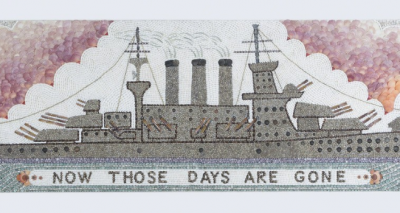
"This beautifully detailed work of art measures three and half feet tall and fourteen feet long, using thousands of shells to depict the USS Kansas. The Kansas was a Connecticut-Class Battleship built in New Jersey and launched in 1905 to become a part of the, so called, Great White Fleet. This fleet, order by President Theodore Roosevelt, consisted of several other battleships that circumnavigated the globe making various military and diplomatic stops to display U.S. naval power in the aftermath of the Spanish-American War. This victory lap around the world sought to celebrate White American racial superiority as the fleet made stops in the recently occupied Caribbean and Pacific Island colonies. The delicate seashell construction contrasts vividly with the brutally destructive power of the battleship with canons, guns, and torpedoes. The warm colored shells in the sky suggest a maritime sunset with radial embellishments in the upper corners. The radiating rays seem to indicate a ubiquitous presence invoking the circumnavigation of the Great White Fleet. Riley’s use of the artwork’s title, now those days are gone, within the piece draw greater attention to multiple inflections of the phrase and it’s relationship to the U.S. imperial power. On the one hand, the phrase invokes a nostalgia for nationalist imperialism, yet the tender construction of the piece reverses this meaning to show it’s fragile nature. The nostalgic interpretation also points to a contemporary decline of U.S. global power and the dangers of reasserting such a position now. Alternatively, the title might indicate that such small battleships, as the Kansas, were immediately eclipsed by the larger, faster, and more deadly Dreadnaught class of battleships. In this interpretation, the days of small battleships are gone, ironically reflected in the tender material of the seashells replaced by behemoth war machines growing ever larger. In the multiple meanings which this artwork puts in play, it also signals a possible future without battleships. One without the racial ideologies and imperial economies which fuel seaborne violence."
- Jason Oliver Chang
Associate Professor of History and Asian American Studies
Director, Asian and Asian American Studies Institute
University of Connecticut

